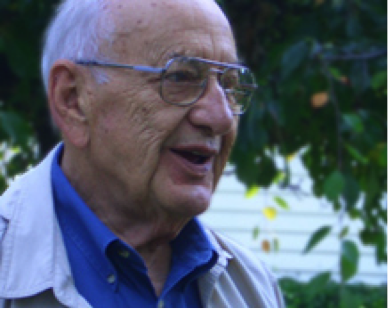This is part of a series remembering and honoring evaluation pioneers leading up to Memorial Day in the USA (May 30).
My name is Mark W. Lipsey, Director of the Peabody Research Institute at Vanderbilt University. No one such as myself who was around in the 1970s when program evaluation came of age could fail to be aware of Peter Rossi’s contributions to that formative process. However, it was not until the late 1990s that I had the opportunity to work with Peter. Howard Freeman, his longstanding collaborator, died shortly after release of the fifth edition of their seminal textbook, Evaluation: A Systematic Approach. Peter had little appetite for undertaking further editions, but the wily Sage editor, C. Deborah Laughton had other ideas. She hinted to Peter that I might be interested in working with him on a sixth edition, and hinted to me that Peter might be interested in having me do so. These reports were, shall we say, inferences since neither of us had actually said anything like this. But it got us together for what proved to be a fruitful collaboration and many provocative conversations as we coauthored our way through the sixth and seventh editions over the subsequent years.
Pioneering and Enduring Contributions:

Few things shape a new field of study as much as the vision embodied in the early textbooks that give coherence to the themes that have begun to knit themselves together as the fabric of that field. As lead author of one of the first textbooks (Rossi & Williams, 1972), followed by Rossi, Freeman, and Rosenbaum (1979) and the multiple editions thereafter, few individuals equal Peter’s influence on the creation and development of program evaluation as a distinct field. At the same time, he was a practicing evaluation researcher who conducted landmark studies on homelessness, poverty, and criminal justice.
Peter was someone for whom, above all, the facts were primary and, therefore, the proper basis for any contribution of program evaluators to policy or practice. He had little regard for those who used program evaluation to push their own ideologies and values. With respect for the facts came respect for the methods that best elucidate those facts, and Peter was an unstinting champion of using the strongest feasible methods to tackle questions about social programs.
Resources:
Rossi, P. H., Freeman, H. E., & Rosenbaum, S. (1979). Evaluation: A systematic approach. Sage.
Rossi, P. H., Lipsey, M. W., & Freeman, H. E. (2004). Evaluation: A Systematic Approach (7th ed.). Sage.
Rossi, P. H., & Williams, W. (1972). Evaluating social programs: Theory, practice, and politics. Seminar Press.
The American Evaluation Association is celebrating Memorial Week in Evaluation: Remembering and Honoring Evaluation’s Pioneers. The contributions this week are remembrances of evaluation pioneers who made enduring contributions to our field. Do you have questions, concerns, kudos, or content to extend this aea365 contribution? Please add them in the comments section for this post on the aea365 webpage so that we may enrich our community of practice. Would you like to submit an aea365 Tip? Please send a note of interest to aea365@eval.org . aea365 is sponsored by the American Evaluation Association and provides a Tip-a-Day by and for evaluators.
